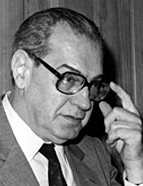

The concepts of patrimonialism and bureaucratic estate, the Iberian roots of the vices of Brazilian political culture and the vision of the historical tendency towards centralisation of power in Brazil since the colonial period are some problematic topics that are still very dear to Brazilian historiography. Research carried out on the Empire's bureaucracy, such as the work carried out by José Murilo de Carvalho, revealed a scenery that was far more fragmented than Faoro seemed to declare. Several authors — such as Fernando Henrique Cardoso — believe there was some exaggeration in the assertion that the bureaucratic-statist elite has persisted throughout Brazilian history, to the point of making it the driving force behind the country's history. Furthermore, one of the main aspects brought up by his detractors is the thesis that states there was a total separation of the bureaucratic estate and the state from the social classes and the economic interests.
In the 1990s, Raymundo Faoro's work took on new political and intellectual contours and was considered — despite the author's own opinion — as the theoretical basis for the neoliberal reforms implemented by the governments of Fernando Collor de Mello and Fernando Henrique Cardoso. His concepts of patrimonialism and bureaucratic estate have come to occupy a privileged space in the public debate around the issues of corruption and state reforms. The vulgarisation of his main concepts was not accompanied by a systematic analysis of his work, and there are still few studies that specifically analyse the Faorian interpretation.His readers, however, point out that Faoro's original contribution had several dimensions, such as: the emphasis on the independence from the political sphere; the inaugural appropriation of Max Weber in Brazil; the questioning of the theses that supported the existence of feudalism in Brazil and Portugal. In 2000, Faoro was unanimously elected to occupy chair number 6 of the ABL. Due to his fragile health, the inauguration was postponed four times and only took place formally in September 2002. According to his son André Leal Faoro, at the time of his death Faoro was working on a book about militarism. He died on 14 May 2003 and was buried in the São João Batista cemetery in south Rio de Janeiro. Minister of Justice Márcio Thomáz Bastos was present at the funeral in representation of President Lula, a friend of Faoro, and reinforced his importance to the foundations of democracy in Brazil.
This work is financed by national funds through FCT - Foundation for Science and Technology, I.P, in the scope of the projects UIDB/04311/2020 and UIDP/04311/2020.
